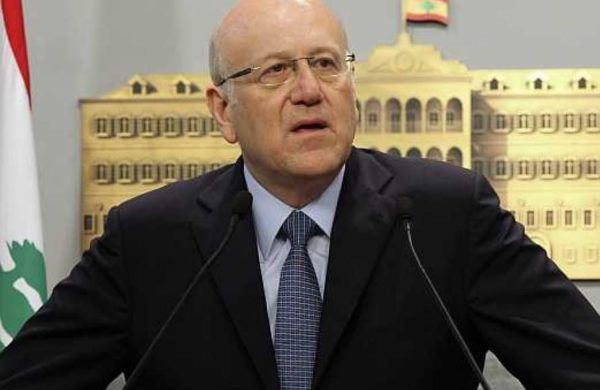Lebanon Caretaker Prime Minister Najib Mikati stressed Wednesday following a caretaker Cabinet session that he is not a sectarian person, after the meeting was boycotted by several Christian ministers affiliated with the Free Patriotic Movement.
“What everyone should understand is that when Cabinet convenes, its aim is not to worsen the rift but rather to serve the citizen,” Mikati said.
“We do not meet to secure something for a group without another and the atmosphere was very comfortable during the session,” the premier added.
“As a Sunni Muslim, I become a patriotic man when I am in the Grand Serail,” Mikati said.
“The session was not aimed at bickering and the meeting witnessed full cooperation,” Mikati added, noting that he will not be dragged into “sectarian debates.”
Noting that the issue of electricity was not fully resolved in the session, the premier said a $62 million loan was approved for the first fuel shipment needed for electricity and another $54 million was approved for maintenance works at the al-Zahrani and Deir Amar power plants.
“We have asked the Energy Minister to begin negotiations with the company,” Mikati went on to say.
And noting that a ministerial panel has been formed to follow up on the issue of electricity, the premier said it has been agreed to hold a third cabinet session next week or the one that follows to discuss “all the urgent matters that the citizen needs.”
Kamal Hayek, chairman of Lebanon’s state electricity company, told reporters that the crippled company has 800 billion Lebanese pounds in the central bank that have lost significant value during the economic crisis due to the country’s ongoing currency devaluation, dropping from over $500 million before the crisis to roughly $16 million. He urged the central bank to let them convert the money to dollars so they can be spent on the company. The pound has lost over 97% of its value against the U.S. dollar since 2019
Lebanon has a complex system of political and religious divisions, often referred to as sectarianism. This system, which is rooted in the country’s history and demographics, has led to ongoing conflicts and power struggles between different religious and ethnic groups. Some experts argue that this system of sectarianism is a major contributor to the political and economic instability that has plagued Lebanon for decades.
According to analysts the funds that will be allocated to the Electricity company will go down to waste because it is the most corrupt institution in Lebanon and has already wasted nearly $50 billion in the last 20 years . Most of the deficit in Lebanon that led to the collapse of the Lebanese economy was reportedly due to the mismanagement of energy ministry by former PM Michel Aoun’s FPM ministers
YL / AP/ News Agencies


Leave a Reply
You must be logged in to post a comment.